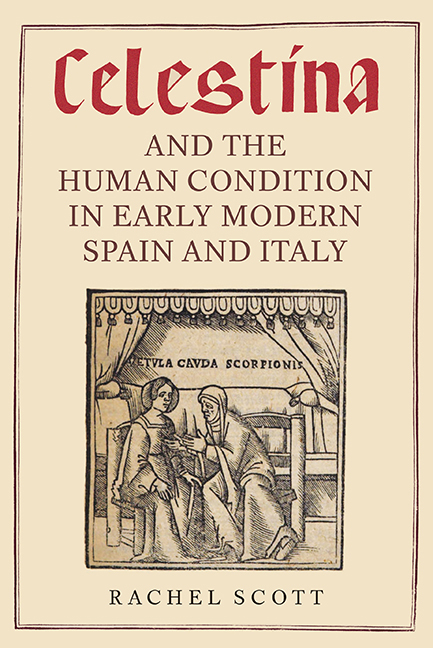Book contents
- Frontmatter
- Dedication
- Contents
- List of Illustrations
- Acknowledgements
- Note on Editions, Transcriptions, and Translations
- Introduction
- 1 Debating the Human Condition: Celestina's Interlocutors
- 2 Self-knowledge and Solitude: Diálogo de la dignidad del hombre
- 3 Fashioning Self and Society: Il Cortegiano
- 4 The Myth of Freedom: La vita delle puttane
- 5 Corrupting Women, Corrupting Words: Coloquio de las damas
- Afterword
- Bibliography
- Index
1 - Debating the Human Condition: Celestina's Interlocutors
Published online by Cambridge University Press: 16 May 2018
- Frontmatter
- Dedication
- Contents
- List of Illustrations
- Acknowledgements
- Note on Editions, Transcriptions, and Translations
- Introduction
- 1 Debating the Human Condition: Celestina's Interlocutors
- 2 Self-knowledge and Solitude: Diálogo de la dignidad del hombre
- 3 Fashioning Self and Society: Il Cortegiano
- 4 The Myth of Freedom: La vita delle puttane
- 5 Corrupting Women, Corrupting Words: Coloquio de las damas
- Afterword
- Bibliography
- Index
Summary
Being Human
The question of miseria et dignitatis hominis encompassed a variety of moral, political, and religious issues, and was approached from a range of perspectives. In arguments espousing his misery, man was characterised as a base, weak and fragile creature, who is born and dies in filth and sorrow, is ruled by animalistic passions (greed, drunkenness, lasciviousness) and subject to the vicissitudes of nature, the elements, and fortune. In contrasting depictions of his dignity, man is believed to have been made in the image of God, is situated at the centre or outside of the cosmos, and is gifted with dominance over the natural world, language, reason, intellect and free will. As María José Vega observed (2011: 5–6), however, the parameters of the debate were not fixed; at different times they focused on different aspects of the issue, made use of different motifs, and were described by terms that evolved as the discourse about humanity also evolved and as new texts become part of the dialogue.
As an example of how ideas about man's nature and condition could change, we need only look at the meanings attributed to the term ‘humano’. A search of the Corpus Diacrónico del Español (CORDE) shows that classical and early medieval interpretations contrasted ‘human’ with ‘animal’ and placed the term in relation with the divine, the body, and knowledge. In contrast, by the sixteenth century it had acquired connotations of ‘courtesy’ and ‘politeness’ as well as mercy and good conversation, and was being used with additional moral and social connotations that focused far more upon the individual's relationship with others and wider social structures – a change that is reflected in the definition of ‘humano’ in early seventeenth century dictionaries, which rely on earlier sources. The 1612 Vocabolario della Crusca not only descibes ‘huomo’ as a reasonable animal – ‘Animal ragionevole’ – it defines mankind thus: ‘Per affabile, benigno, mansueto, trattabile’. Likewise, in Sebastián de Covarrubias's 1611 Tesoro de la lengua castellana o española, to be ‘humano’ not only signified ‘Aquello que puede pertenecer al hombre’ or ‘los descendientes de Adán’, but ‘el que es apacible, compasible, acariciador, benigno y manso’ (2006: 1078).
- Type
- Chapter
- Information
- Publisher: Boydell & BrewerPrint publication year: 2017

